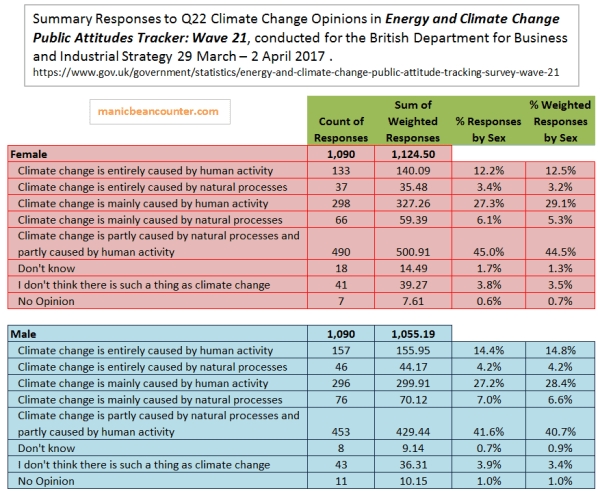After Christopher Booker’s excellent new Report for the GWPF “Global Warming: A Case Study In Groupthink” was published on 20th February, Bob Ward (Policy and Communications Director at the Grantham Research Institute on Climate Change and the Environment at the LSE) typed a rebuttal article “Do male climate change ‘sceptics’ have a problem with women?“. Ward commenced the article with a highly misleading statement.
On 20 February, the Global Warming Policy Foundation launched a new pamphlet at the House of Lords, attacking the mainstream media for not giving more coverage to climate change ‘sceptics’.
I will lead it to the reader to judge for themselves how misleading the statement is by reading the report or alternatively reading his summary at Capx.co.
At Cliscep (reproduced at WUWT), Jaime Jessop has looked into Ward’s distractive claims about the GWPF gender bias. This comment by Ward particularly caught my eye.
A tracking survey commissioned by the Department for Business, Energy and Industrial Strategy showed that, in March 2017, 7.6% answered “I don’t think there is such a thing as climate change” or “Climate change is caused entirely caused by natural processes”, when asked for their views. Among men the figure was 8.1%, while for women it was 7.1%.
I looked at the Tracking Survey. It is interesting that the Summary of Key Findings contains no mention of gender bias, nor of beliefs on climate change. It is only in the Wave 21 full dataset spreadsheet that you find the results of the question 22.
Q22. Thinking about the causes of climate change, which, if any, of the following best describes your opinion?
[INVERT ORDER OF RESPONSES 1-5]
1. Climate change is entirely caused by natural processes
2. Climate change is mainly caused by natural processes
3. Climate change is partly caused by natural processes and partly caused by human activity
4. Climate change is mainly caused by human activity
5. Climate change is entirely caused by human activity
6. I don’t think there is such a thing as climate change.
7. Don’t know
8. No opinion
Note that the first option presented to the questionee is 5, then 4, then 3, then 2, then 1. There may, therefore, be an inbuilt bias in overstating the support for Climate Change being attributed to human activity. But the data is clearly presented, so a quick pivot table was able to check Ward’s results.
The sample was of 2180 – 1090 females and 1090 males. Adding the responses to “I don’t think there is such a thing as climate change” or “Climate change is caused entirely caused by natural processes” I get 7.16% for females – (37+41)/1090 – and 8.17% for males – (46+43)/1090. Clearly, Bob Ward has failed to remember what he was taught in high school about roundings.
Another problem is that this is raw data. The opinion pollsters have taken time and care to adjust for various demographic factors by adding a weighting to each line. On this basis, Ward should have reported 6.7% for females, 7.6% for males and 7.1% overall.
More importantly, if males tend to be more sceptical of climate change than females, then they will be less alarmist than females. But the data says something different. Of the weighted responses, to those who opted for the most extreme “Climate change is entirely caused by natural processes“, 12.5% were female and 14.5% were male. Very fractionally at the extreme, men are proportionality more alarmist than females than they are sceptical. More importantly, men are slightly more extreme in their opinions on climate change (for or against) than women.
The middle ground is the response to “Climate change is partly caused by natural processes and partly caused by human activity“. The weighted response was 44.5% female and 40.7% male, confirming that men are more extreme in their views than women.
There is a further finding that can be drawn. The projections by the IPCC for future unmitigated global warming assume that all, or the vast majority of, global warming since 1850 is human-caused. Less than 41.6% of British women and 43.2% of British men agree with this assumption that justifies climate mitigation policies.
Below are my summaries. My results are easily replicated for those with an intermediate level of proficiency in Excel.

Learning Note
The most important lesson for understanding data is to analyse that data from different perspectives, against different hypotheses. Bob Ward’s claim of a male gender bias towards climate scepticism in an opinion survey, upon a slightly broader analysis, becomes one where British males are slightly more extreme and forthright in their views than British females whether for or against. This has parallels to my conclusion when looking at the 2013 US study “The Role of Conspiracist Ideation and Worldviews in Predicting Rejection of Science” – Stephan Lewandowsky, Gilles E. Gignac, Klaus Oberauer. Here I found that rather than the paper’s finding that conspiracist ideation being “associated with the rejection of all scientific propositions tested”, the data strongly indicated that people with strong opinions on one subject, whether for or against, tend to have strong opinions on other subjects, whether for or against. Like with any bias of perspective, (ideological, religious, gender, race, social class, national, football team affiliation etc.) the way to counter bias is to concentrate on the data. Opinion polls are a poor starting point, but at least they may report on perspectives outside of one’s own immediate belief systems.